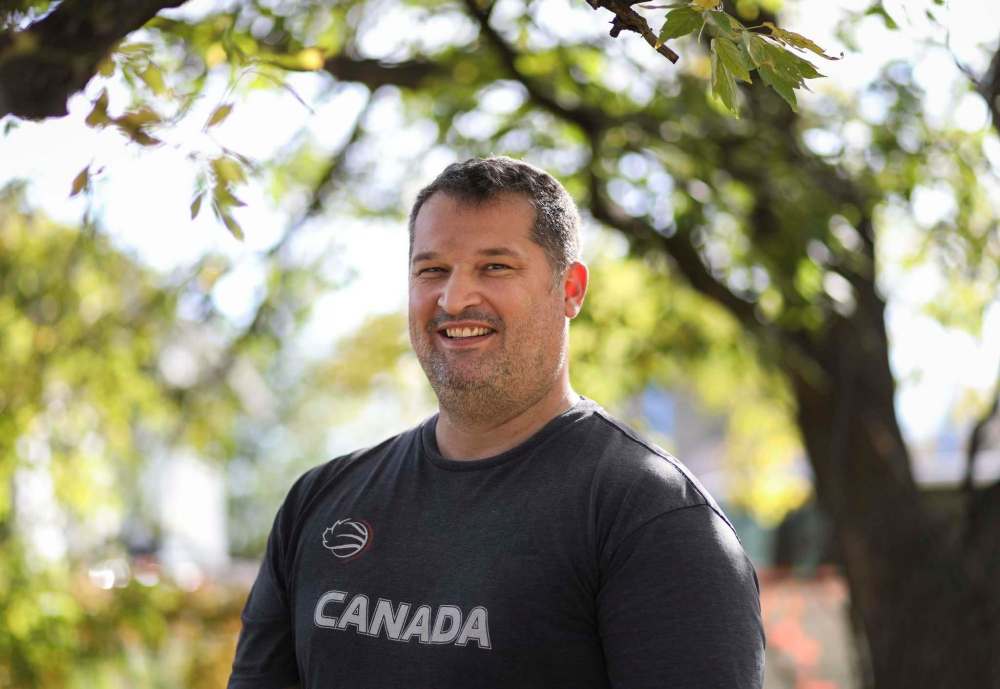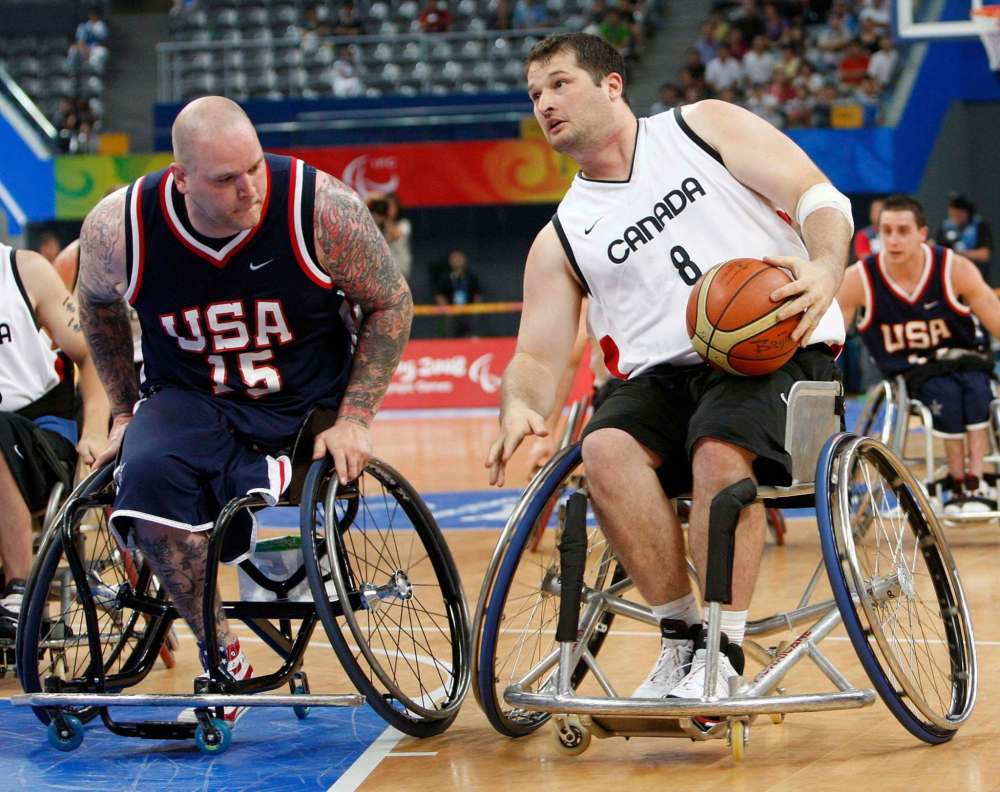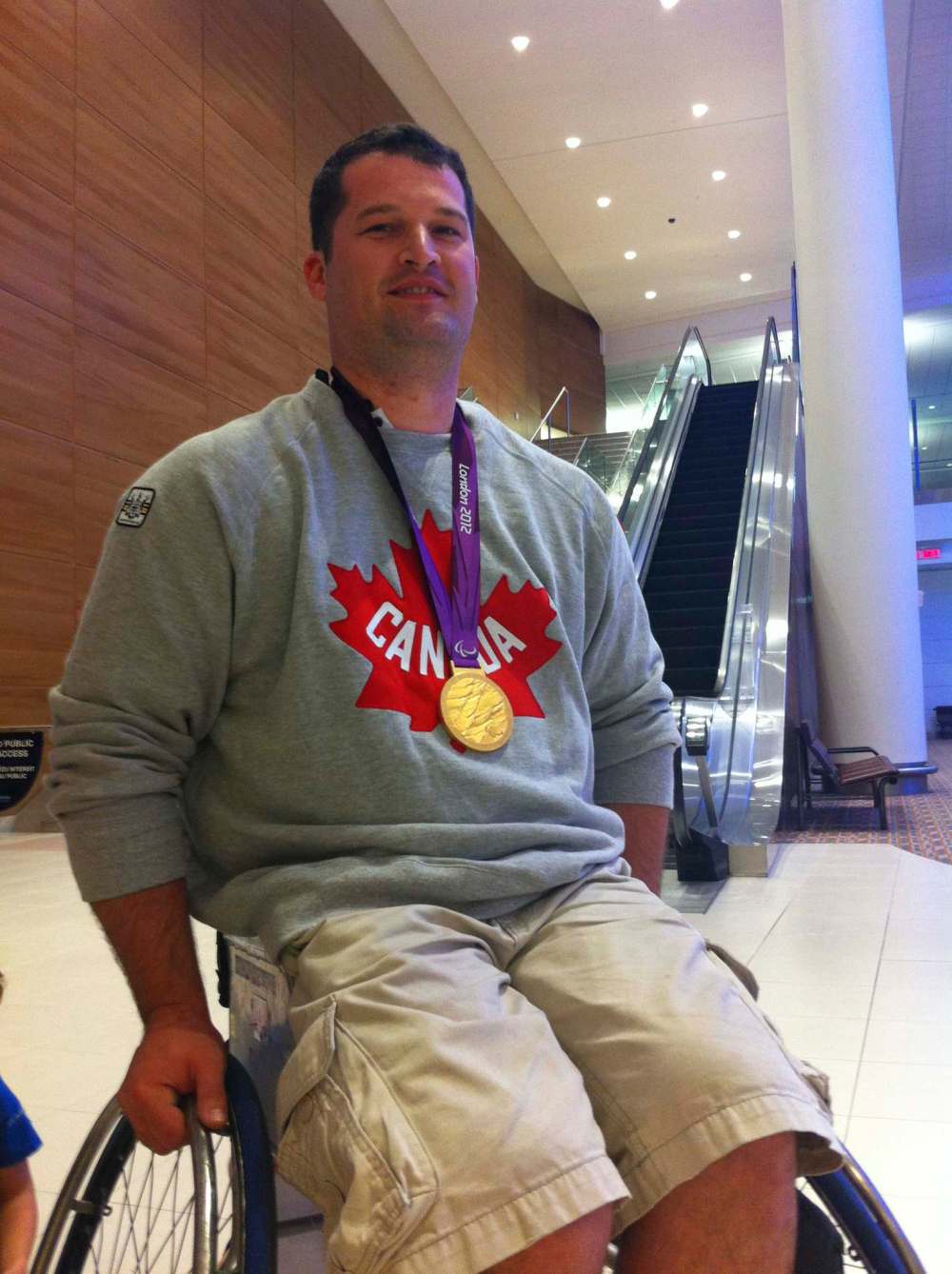Expanding the reach of adaptive sports Legendary wheelchair basketball player embraces new role with Manitoba Wheelchair Sport Association
Read this article for free:
or
Already have an account? Log in here »
To continue reading, please subscribe:
Monthly Digital Subscription
$0 for the first 4 weeks*
- Enjoy unlimited reading on winnipegfreepress.com
- Read the E-Edition, our digital replica newspaper
- Access News Break, our award-winning app
- Play interactive puzzles
*No charge for 4 weeks then price increases to the regular rate of $19.00 plus GST every four weeks. Offer available to new and qualified returning subscribers only. Cancel any time.
Monthly Digital Subscription
$4.75/week*
- Enjoy unlimited reading on winnipegfreepress.com
- Read the E-Edition, our digital replica newspaper
- Access News Break, our award-winning app
- Play interactive puzzles
*Billed as $19 plus GST every four weeks. Cancel any time.
To continue reading, please subscribe:
Add Free Press access to your Brandon Sun subscription for only an additional
$1 for the first 4 weeks*
*Your next subscription payment will increase by $1.00 and you will be charged $16.99 plus GST for four weeks. After four weeks, your payment will increase to $23.99 plus GST every four weeks.
Read unlimited articles for free today:
or
Already have an account? Log in here »
Hey there, time traveller!
This article was published 22/09/2021 (1538 days ago), so information in it may no longer be current.
When Joey Johnson tells his story, he describes it as the most devastating part of his life. He was eight years old when he sat in the doctor’s office and found out that he had a degenerative hip disease.
“I remember sitting there and being like ‘OK, what does that mean? When can I get back on the rink? I want to go play with my buddies.’ And the doctor said ‘No, there will be no more hockey for you,'” Johnson told the Free Press Wednesday.
“I literally sat in his office crying on my mom’s lap for an hour before we got out of there.”
Johnson, now 46, was an active child who grew up wanting to play in the NHL and represent Canada on the biggest stage. The diagnosis ruined his dream of one day hoisting the Stanley Cup over his head, but it did, however, open up a path for him to wear the red and white and be a trailblazer along the way.
Johnson is one of the most accomplished athletes to ever come out of Manitoba as he went on to become a wheelchair basketball legend. A five-time Paralympian, Johnson helped Canada establish itself as a wheelchair basketball powerhouse, winning three gold medals (2000, 2004, and 2012) and a silver (2008) in his 18-year tenure with the national team.

Johnson was also an all-american at the University of Wisconsin-Whitewater, a world champion in 2006, and played professionally for over a decade with stops in Australia and Germany. In 2013, he became the first Paralympic athlete inducted into the Manitoba Basketball Hall of Fame. Three years later, he was inducted into the Manitoba Sports Hall of Fame.
“Now being older and looking back, I can tell how many more doors opened up for me and the opportunities that were provided to me because of adaptive sport,” said Johnson, who now resides with his family in Lorette.
“I wouldn’t change my life for the world. I’ve had a great life. I got to travel the world, lived in multiple countries playing a sport that I loved, and got paid to play a sport that I love. A lot of people aren’t that fortunate in life and I got to live my dreams.”
Johnson, who also works as an assistant coach for Wheelchair Basketball Canada, is now in a position to give back to the local adaptive sport community as it was announced this week he has accepted a position with the Manitoba Wheelchair Sport Association to be a program co-ordinator. He will work with the community to support wheelchair basketball, wheelchair rugby, and wheelchair tennis.
Johnson believes his biggest challenges in the position are raising awareness and educating others on what the adaptive sports scene has to offer.
“Picture yourself as someone with a disability and you don’t know that these opportunities exist and that’s the point that I really want to emphasize… I have a lot of ideas that I’d like to start implementing through the schools. Hopefully one day we’ll even have a school league where all the schools are competing in wheelchair basketball,” he said.
“I’m definitely a big dreamer and I have a lot of ideas and now it’s just a matter of getting down to doing the work and getting it done.”

Johnson first started playing the game at the age of nine. He was on crutches and had some braces that he had to use and was reluctant to hop in the chair and give it a shot. Once he did, he fell in love and the rest was history.
Since then, he has seen a lot of growth in adaptive sports over the years. He points to the 2000 Sydney Paralympics when he and his Canadian teammates made history by winning the country’s first gold medal in men’s wheelchair hoops. Despite the monumental feat, it didn’t air on television locally until three months later and it was given the 11 p.m. timeslot.
It was a much different story this summer as the Tokyo Paralympics received a boost in coverage with many events airing live. However, Johnson believes there’s still a long way to go.
“Adaptive athletes want to be viewed as athletes first. There’s all kinds of human stories to how they got to the journey to the Paralympics. A lot of times people want to focus on the tragedies that they’ve overcome, but everyone has hardships in life,” he said.

“Everyone I know that competes in the Paralympics wants to be known as a great swimmer, a great basketball player or a great track and field athlete. It’s not about the human tragedies that they’ve gone through.”
For Johnson, it’s also not just about high-level adaptive sports. Of course, he’d love to find the next local wheelchair basketball star, especially as the Canadian men’s team currently doesn’t have any Manitobans on it, but it’s about providing a playing field for everyone. When he was a young kid in school he’d be given a whistle and be expected to referee or he would be asked to keep score — both of which were agonizing to him. It pains Johnson to think there’s a kid somewhere out there not getting to participate in physical activity because they don’t know about adaptive sports.
Their weekly wheelchair basketball drop-in program typically gets more than a dozen kids who show up and play, which are solid numbers, but Johnson knows there’s more out there they can get involved.
“The best word I can say is that it’s liberating to them. They find access to the world that they thought was taken away from them. It’s so liberating and you have the freedom to play with your peers,” he said.
“That’s the beautiful part about wheelchair basketball especially, is that you can have a disability but yet, you can bring all your buddies out and once they sit in the chair, it’s a level playing field again. So, you can play with all your friends, your siblings, and it’s a great feeling. When you see a smile on a kid’s face wheeling out on that court, it’s a lot of fun.”
taylor.allen@freepress.mb.ca
Twitter: @TaylorAllen31

Eighteen years old and still in high school, Taylor got his start with the Free Press on June 1, 2011. Well, sort of...
Our newsroom depends on a growing audience of readers to power our journalism. If you are not a paid reader, please consider becoming a subscriber.
Our newsroom depends on its audience of readers to power our journalism. Thank you for your support.








